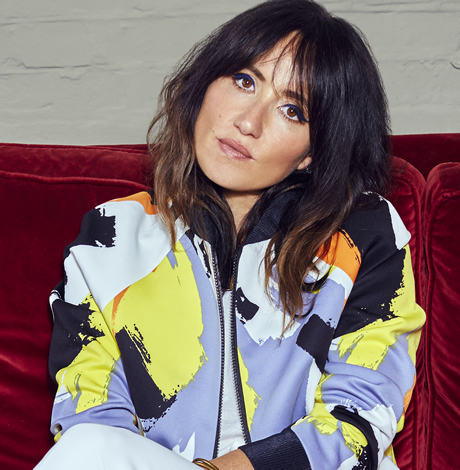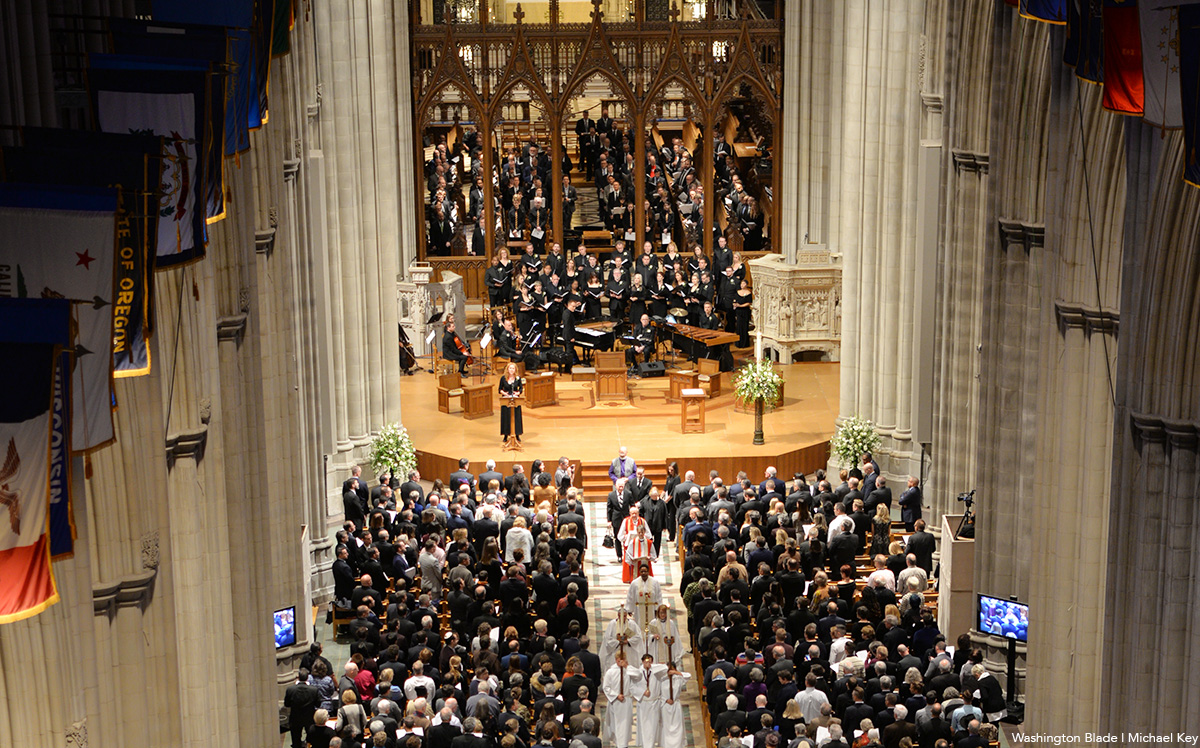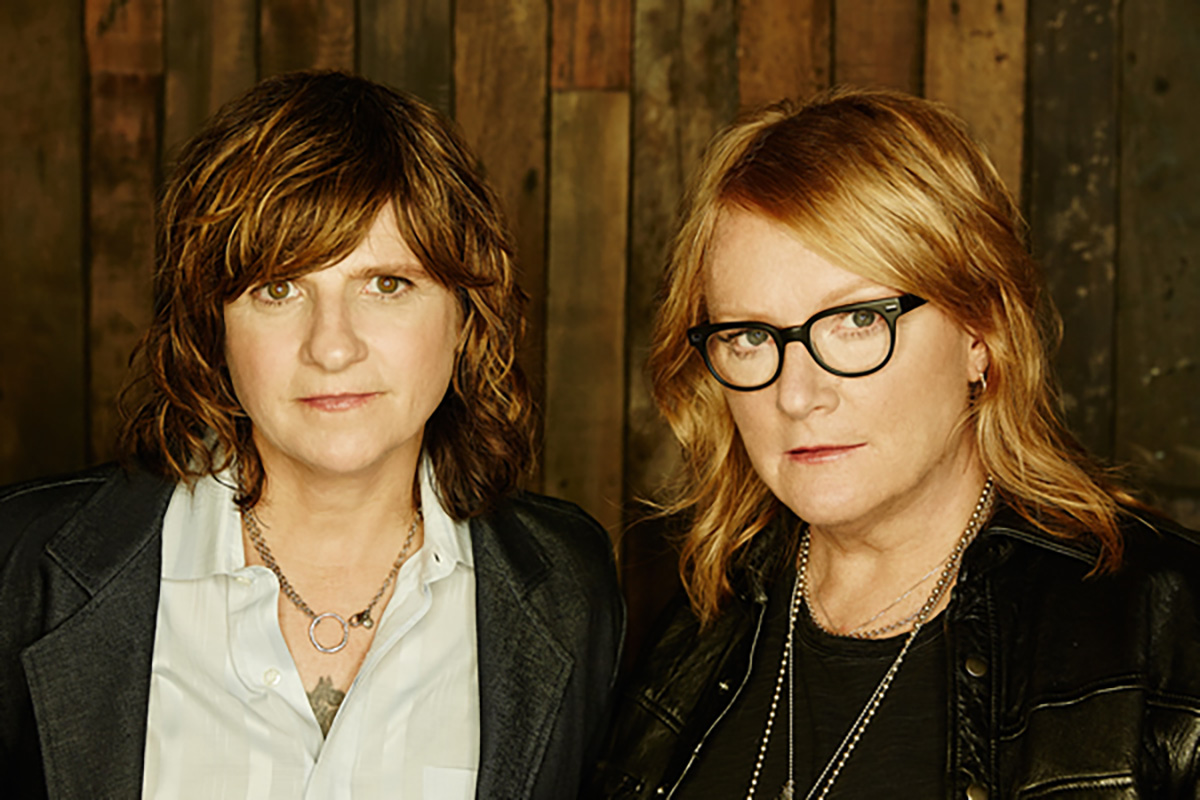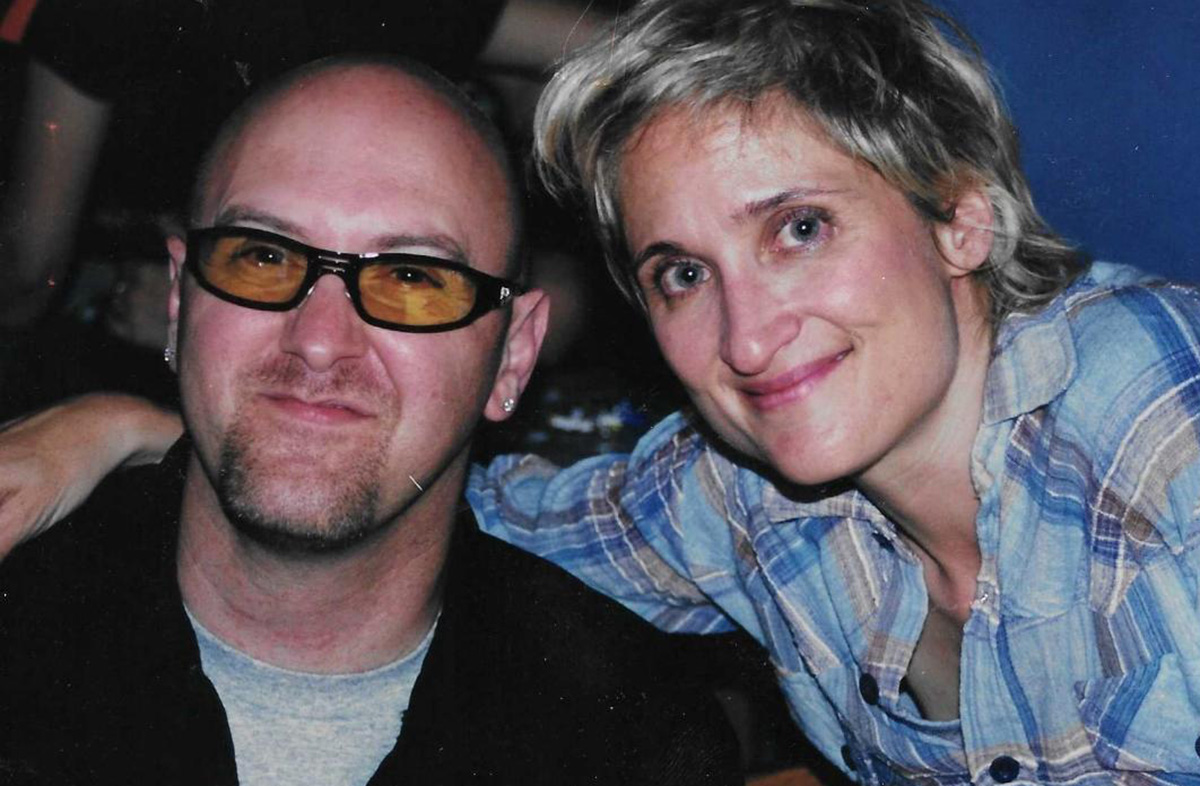Music & Concerts
KT Tunstall finds joy after trial, creative burnout
‘Suddenly I See’ singer returns to the big pop sound that brought her success


KT Tunstall plays the Lincoln Theatre on Wednesday, Sept. 14. (Photo by Tom Oxley)
KT Tunstall
Wednesday, Sept. 14
The Lincoln Theatre
1215 U St., N.W.
thelincolndc.com
6:30 p.m.
$35
KT Tunstall’s hit 2005 single “Suddenly I See” from her debut album “Eye to the Telescope” was heard on every screen big and small from the film “The Devil Wears Prada” to being featured on shows like “Grey’s Anatomy.” That kind of success may have appeared like the best time in a musician’s life, but now following the death of her father and a divorce from her husband, drummer Luke Bullen, Scottish singer-songwriter Tunstall, 41, is the happiest she’s ever been. Her new album “KIN,” released on Sept. 9, reflects how she was able to come out on the other side with not only new material, but a fresh perspective.
Washington Blade spoke with Tunstall from the road on tour in promotion of her latest album about how she was able to turn pain into art, her distaste for sexuality labels and how she accidentally gained a lesbian following with a simple wardrobe choice.
WASHINGTON BLADE: What was the inspiration behind your latest album “KIN?” What was the recording process like?
KT TUNSTALL: It was a real rollercoaster ride actually and quite unexpected. The last record I made had been a down-tempo, folk record (2013’s “Invisible Empire//Crescent Moon”). During the recording my dad had died and my marriage broke up. So it was just this tectonic shift in life and it was very intense. I was very proud of the record, but it was the first time I had written a record that wasn’t very dynamic. I went on tour, mostly solo, and I’m wearing this amazing custom-made Dior suit and playing to seated audiences for the first time in beautiful theaters. But I just got completely burnt out and I felt that I was done really with making records for a good while and I didn’t want to make another record and I didn’t want to tour. And I just think that on a personal level I just had all of that stuff happen and I just needed to start again.
So I sold everything I owned and I moved to Venice Beach in California. I really intended to just focus on film music for a little while. I’d wanted to record music for film for many years and hadn’t had time. I trained with the Sundance Institute for a year, and built some relationships in the film industry and wrote for some short films. I was just loving life and finally finding life where I could be and not just do. Because it had just been 100 percent doing living in London and never finding any peace and tranquility in life.
So I really found sanctuary in Venice Beach. While living there, I really loved listening to music in the car and I’d be driving around listening to Joni Mitchell, Neil Young, Fleetwood Mac and Tom Petty driving around Laurel Canyon and the PCH (Pacific Coast Highway). After about a year I just started writing these really big, muscular, emotional pop choruses. And they just started coming and my brain and my body were just like, ’No I don’t want to do it!” and really its up to the subconscious and the spirit and they took over and were like ‘Nope you’re gonna do it.” It’s definitely a very kindred spirit to the first album. It feels like I’ve taken three records to write my second album. Not to disrespect the other records because I’m really proud of them, but I just feel like for the first time since the first record I’m in a really carefree, unselfconscious, vulnerable, strong place again. And it’s that mixture of being vulnerable and being strong at the same time that I think leads to my best music personally.
I’d just become very self conscious, very guarded after becoming successful. And it took cutting the umbilical cord with needing to make records and being a record-producing solo artist completely defining who I was. I didn’t know who I was outside of being that and I needed to find out and I needed to let go of it to find out, and then I did find out, and it’s awesome. And now I feel like a total boss now and I’m ready to go. It feels like part two of a story.
BLADE: A lot of people after coming out of a rough personal patch could have come back and made a really angry or sad album. “KIN” is more happy and hopeful. Why did you decide on a more uplifting approach?
TUNSTALL: It’s what’s come out. I’m the happiest I’ve ever been. It’s such a journey and now I understand. I hadn’t gone through things like that before, the death of a parent and break up of a marriage and moving continents. And it was just the most liberating, transformative experience. Yeah, it was really, really hard at times. But I look at where I am in my life now and I love where I live. I have such great friends and family. My life is much simpler. I never would have found this place if that whole shit storm hadn’t hit me. I’d have never taken the time to take myself apart and look at the darkest corners. I deconstructed myself and put myself back together in a much healthier way. So really the record is for me to go and celebrate with the human beings that these really difficult times in your life can actually provide you with a clear path to something better than you had before.
BLADE: How did your lesbian following come about? How do you feel about it?
TUNSTALL: I’ve always been very flattered and very happy that a group of people who have to deal with a load of shit on a daily basis, that they shouldn’t have to deal with, find meaning and attachment to my music. I think it’s a really big compliment. My gay followers have been incredibly loyal as well. I really relate to the gay community. I feel total indigenous that there is anything but support for human beings loving each other, getting married, living together and having children together. I just don’t fucking understand anyone having a problem with other people being happy. So I’ve always championed and fought hard for opinion to change on that. I think it probably stemmed from the fact that, first of all, I’m not a female singer that bares a lot of skin when I play. I think that my fashion sense has always had an element of androgyny to it. So I think that probably had people questioning my sexuality. I know because I would read about it. And also, my first record cover I wanted to pay homage to Patti Smith on the cover of “Horses.” I love “Mork and Mindy” and I love Robin Williams’ rainbow suspenders. My stylist on the shoot thought this would be fun, a big child version of Patti Smith. We didn’t think twice about it and, of course, it was like a an absolute rainbow flag that I was gay when it isn’t meant to be that. It was a total oversight by everyone and looks like I’m gay, but I’m not. Although having said that, I don’t like to put labels on it. And I love the fact that the younger generation are refusing to put labels on it because at that age, I would absolutely relate to that feeling of not wanting to put myself in a box. I grew up in theater and music and it’s weird if you don’t kiss people who are girls or boys. It’s uptight not to. It was always pretty fluid in the community I grew up with as a late teenager and early 20s and all that. It’s exciting times I think that it’s becoming questions that these labels are as rigorous as they are.
BLADE: What do you want people to take away from your upcoming show?
TUNSTALL: Joy one hundred percent. That’s the goal. For me that’s the meaning of life, finding that in your life. And doing whatever you need to do to find it, and follow it and be aware of what brings you joy. Not to fight difficulty and confrontation and try and rise through the hard times with grace and love. The thing that’s so amazing for me playing this new material for audiences is I’m just seeing them feeling, grinning, laughing and dancing and maybe sometimes crying at the same time. It’s just a beautiful connection between human beings and recognizing that, yeah, life is shit sometimes, but we survived and we’re here and we’re dancing and we’re celebrating being here.
Music & Concerts
Berkshire Choral to commemorate Matthew Shepard’s life
Concert held at Washington National Cathedral

Berkshire Choral International will present a concert performance of composer Craig Hella Johnson’s fusion oratorio “Considering Matthew Shepard” on Friday, July 11, 2025 at 7:30 p.m. at the Washington National Cathedral.
The program will be guest conducted by Dr. Jeffrey Benson, a native of the DMV who currently serves as Director of Choral Activities at San José State University. The concert is a partial benefit for the Matthew Shepard Foundation. Notably, Matthew’s remains are interred at the National Cathedral and his parents, Dennis and Judy, will give opening remarks at the performance.
Tickets are $20 – $65, and 50% of ticket proceeds will be donated to the Matthew Shepard Foundation. Tickets are only available online at berkshirechoral.org.
Music & Concerts
Indigo Girls coming to Capital One Hall
Stars take center stage alongside Fairfax Symphony

Capital One Center will host “The Indigo Girls with the Fairfax Symphony Orchestra” on Thursday, June 19 and Friday, June 20 at 8 p.m. at Capital One Hall.
The Grammy Award-winning folk and pop stars will take center stage alongside the Fairfax Symphony, conducted by Jason Seber. The concerts feature orchestrations of iconic hits such as “Power of Two,” “Get Out The Map,” “Least Complicated,” “Ghost,” “Kid Fears,” “Galileo,” “Closer to Fine,” and many more.
Tickets are available on Ticketmaster or in person at Capital One Hall the nights of the concerts.
Music & Concerts
Underdog glorious: a personal remembrance of Jill Sobule
Talented singer, songwriter died in house fire on May 1

I’ve always prided myself on being the kind of music consumer who purchased music on impulse. When I stumbled across “Things Here Are Different,” Jill Sobule’s 1990 MCA Records debut album on vinyl in a favorite Chicago record store, I bought it without knowing anything about her. This was at a time when we didn’t have our phones in our pockets to search for information about the artist on the internet. The LP stayed in my collection until, as vinyl was falling out of fashion, I replaced it with a CD a few years later.
Early in my career as an entertainment journalist, I received a promo copy of Jill’s eponymous 1995 Atlantic Records album. That year, Atlantic Records was one of the labels at the forefront of signing and heavily promoting queer artists, including Melissa Ferrick and Extra Fancy, and its roster included the self-titled album by Jill. It was a smart move, as the single “I Kissed A Girl” became a hit on radio and its accompanying video (featuring Fabio!) was in heavy rotation on MTV (when they still played videos).
Unfortunately for Jill, she was a victim of record label missteps. When 1997’s wonderful “Happy Town” failed to repeat the success, Atlantic dumped her. That was Atlantic’s loss, because her next album, the superb “Pink Pearl” contained “Heroes” and “Mexican Wrestler,” two of her most beloved songs. Sadly, Beyond Music, the label that released that album ceased to exist after just a few years. To her credit, the savvy Jill had also started independently releasing music (2004’s “The Folk Years”). That was a smart move because her next major-label release, the brilliant “Underdog Victorious” on Artemis Records, met a similar fate when that label folded.
With her 2009 album “California Years,” Jill launched her own indie label, Pinko Records, on which she would release two more outstanding full-length discs, 2014’s “Dottie’s Charms” (on which she collaborated with some of her favorite writers, including David Hadju, Rick Moody, Mary Jo Salter, and Jonathan Lethem), and 2018’s stunning “Nostalgia Kills.” Jill’s cover of the late Warren Zevon’s “Don’t Let Us Get Sick” on “Nostalgia Kills” was particularly poignant as she had toured with him as an opening act.
Jill was a road warrior, constantly on tour, and her live shows were something to behold. My first interview with Jill took place at the Double Door in Chicago in early August of 1995, when she was the opening act for legendary punk band X. She had thrown her back out the previous day and was diagnosed with a herniated disc. To be comfortable, she was lying down on a fabulous-‘50s sofa. “I feel like I’m at my shrink’s,” she said to me, “Do you want me to talk about my mother?”
That sense of humor, which permeated and enriched her music, was one of many reasons to love Jill. I was privileged to interview her for seven of her albums. Everything you would want to know about her was right there in her honest lyrics, in which she balanced her distinctive brand of humor with serious subject matter. Drawing on her life experiences in songs such as “Bitter,” “Underachiever,” “One of These Days,” “Freshman,” “Jetpack,” “Nothing To Prove,” “Forbidden Thoughts of Youth,” “Island of Lost Things,” “Where Do I Begin,” “Almost Great,” and “Big Shoes,” made her songs as personal as they were universal, elicited genuine affection and concern from her devoted fans.
While she was a consummate songwriter, Jill also felt equally comfortable covering songs made famous by others, including “Just A Little Lovin’” (on the 2000 Dusty Springfield tribute album “Forever Dusty”) and “Stoned Soul Picnic” (from the 1997 Laura Nyro tribute album “Time and Love”). Jill also didn’t shy away from political subject matter in her music with “Resistance Song,” “Soldiers of Christ,” “Attic,” “Heroes,” “Under the Disco Ball,” and the incredible “America Back” as prime examples.
Here’s something else worth mentioning about Jill. She was known for collaboration skills. As a songwriter, she maintained a multi-year creative partnership with Robin Eaton (“I Kissed A Girl” and many others), as well as Richard Barone, the gay frontman of the renowned band The Bongos. Jill’s history with Barone includes performing together at a queer Octoberfest event in Chicago in 1996. Writer and comedian Julie Sweeney, of “SNL” and “Work in Progress” fame was another Chicago collaborator with Sobule (Sweeney lives in a Chicago suburb), where they frequently performed their delightful “The Jill and Julia Show.” John Doe, of the aforementioned band X, also collaborated with Jill in the studio (“Tomorrow Is Breaking” from “Nostalgia Kills”), as well as in live performances.
On a very personal note, in 2019, when I was in the process of arranging a reading at the fabulous NYC gay bookstore Bureau of General Services – Queer Division, I reached out to Jill and asked her if she would like to be on the bill with me. We alternated performing; I would read a couple of poems, and Jill would sing a couple of songs. She even set one of my poems to music, on the spot.
Jill had an abundance of talent, and when she turned her attention to musical theater, it paid off in a big way. Her stage musical “F*ck 7th Grade,” a theatrical piece that seemed like the next logical step in her career, had its premiere at Pittsburgh’s City Theatre in the fall of 2020, during the height of the pandemic. The unique staging (an outdoor drive-in stage at which audience members watched from their cars) was truly inspired. “F*ck 7th Grade” went on to become a New York Times Critic’s pick, as well as earning a Drama Desk nomination.
In honor of the 30th anniversary of Jill’s eponymous 1995 album, reissue label Rhino Records is re-releasing it on red vinyl. Jill and I had been emailing each other to arrange a time for an interview. We even had a date on the books for the third week of May.
When she died in a house fire in Minnesota on May 1 at age 66, Jill received mentions on network and cable news shows. She was showered with attention from major news outlets, including obits in the New York Times and Rolling Stone (but not Pitchfork, who couldn’t be bothered to review her music when she was alive). Is it wrong to think that if she’d gotten this much attention when she was alive she could have been as big as Taylor Swift? I don’t think so.


















